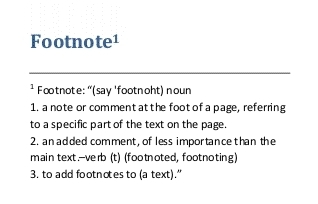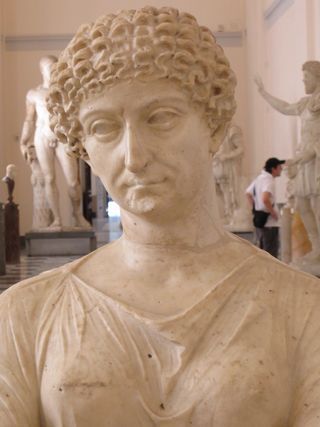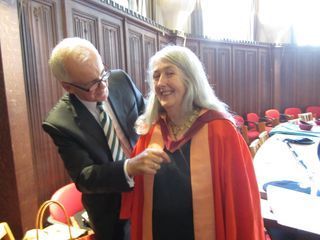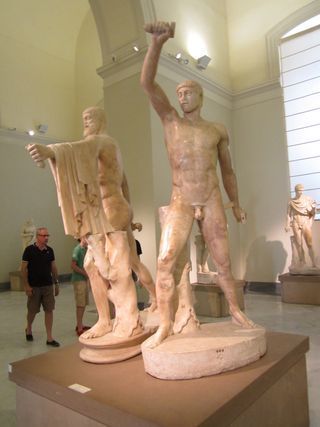Mary Beard's Blog, page 53
August 9, 2012
How many words can you write in a day?
I am being -- so far as the outside world is concerned -- a very dull girl. That is to say I am blissfully happy, hidden away, writing. I get up in the morning, do the emails and stuff, then go to my (newly tidied) study, lie on my library bed (yes, above -- a rather nifty and cheap auction purchase a few years ago, which allows you to semi-recline with laptop conveniently on knee, books to either side), and I type away.
The project is to get a draft of my book on Roman laughter done by the end of the long vacation. I had 20,000 words already, and I reckon I have done 25,000 more.. and another 60,000 to go. To put that another way, I am just finishing chapter 4, and I have some 6 chapters left (but they are much closer to the lectures I gave in Berkeley so I am hoping they go quicker).
The truth is that I know, honestly, I am NOT going to write 60,000 new words by Oct 4, but if I could be within sight of the target, then I would be happy. Because I really have to start the next project seriously on 1 January.
I could go on, but you can no doubt see already the kind of calculations that are going on in the Beard head, as the paragraphs don't come. How many words can you write in a day.. or how many good words?
My friend Ruth (with whom I had a quick coffee today at the newly refurbished Nasreen Dar coffee lounge, just near our houses -- if you Cambridge folk are interested in this) argues that 500 words of proper original academic writing per day is all you can ever hope for. But I have no doubt that if that is all I manage on writing days (and you have to factor in library days too), then my target is a long way off.
So I have taken to aiming for 1000 a day, knowing full well that I have to start each mnoring rewriting the last 250 written the day before. And when I say 1000, I mean minus the footnotes -- the plan being (for once in my damn life) to put the footnotes in more or less as I go.
The problem is that there is an awful lot of bella figura attached to this words per day total. And people tend to divide between the ridiculously self effacing ("it really takes me at least a day to write even 100 words") and the loathsomely self confident ("ha ha another chapter done this morning"). Neither of which can be quite true.
So far I've been talking about first production, original academic stuff. But much the same thing is true about reviews, and the Scylla and Charybdis of too fast and too slow. On the one hand are people you meet who say "I'm just reading the book this morning and I'll get that 1000 words written by lunch time" (and I think .. those words just wont be any good, you need to THINK about books and HOW to review them, not just spurge 1000 words by lunch). On the other are those who say, "1000 words, I'm afraid it will take me at least 6 months" (and then I think... how on earth can it take anyone SIX MONTHS to write a 1000 words about a 200 page book...).
But the truth is you never know the TRUTH -- or the degrees of anxiety and dissembling that lie behind all those carefully calibrated claims (mine included, I guess).
I'd love to know what other people think is a good daily rate. Fiction vs non fiction... essays vs review...'Fess up people.
August 5, 2012
How good a role model ARE these Olympic athletes?
I happily confess to having enjoyed the Olympics much more than I ever thought I would. Indeed I have changed from my slightly sneery attitude on the first few days of competition (OK, so where are those medals we all heard about?) to being rather jolly when we win another one. Indeed I have the BBC live text commentary open on my laptop screen -- and I don't think I could ever get keener than that.
All the same, I do think we have got a bit over the top on whole sport thing, on how it is going to inspire the nation (to what??) .. and so on. Every newspaper, even the usually cynical, is just full of it.
So let me share a couple of these doubts.
DOUBT ONE. I think we can take it as read that the country's health and well-being would be improved if most people did more exercise, just a bit more. Mens sana in corpore sano and all that. But are these hugely over-trained athletes really any kind of role model for that?
OK I realise that what counts as "discipline" and what counts as "cruel over training" is always a fine distinction. We're very happy to point an ethnocentric finger at the "fanatical" Chinese, while patting ourselves on the back for having made champions of the "girls next door". And I know it must differ a bit from sport to sport. But so far as I can see there is very little "healthy" in the normal sense of that word about what many of these sports-people have done to themselves. You only have to look at some of their legs and arms on the telly to see that they are not "normal" on any spectrum of normality, but that they have obsessively exploited the further reaches of the capacity of the human body, to turn in a minutely better time in some running race.
Take Jessica Ennis, for example. Actually I have quite a soft spot for her and am dead pleased she won. But a quick glance at her website shows just what a "worked on" machine she is: "Team Jennis" includes: a physiotherapist, a soft tissue specialist, a coach, a javelin coach, a physiologst, a biomechanist.. and that's before you get the the "management". Most of the athletes (even the shooters) are "training" at least 5 hours a day.
Now, sure, obsession comes in various forms. And there would be many peope who would say that my desire to spend 14 hours a day writing at my laptop was generally bad for my health both short and longterm. But God knows what the long term effect of all this athletic physical pressure is. (A quick visit to the Centre for the Study of Retired Athletes at the University of North Carolina is a bit depressing on that score, I can tell you!)
Frankly, it seems to me that if we all were to follow the model of our Olympians we'd probably cost the NHS a lot more eventually than if we all stayed couch potatoes.
So much as we love watching and cheering, can we stop thinking of these sports stars as "fit". At least, it's a bloody odd, and hugely immoderate form of "fitness".
DOUBT TWO, of course, is where they all come from. I'm picking up here on the many press reports that point to the "disproportionate" number who went to independent schools. Now if you teach at Obbridge, you are used to this kind of thing. And I was seriously waiting for someone to attack the Olympic selectors for class prejudice.
But no, in this case it is the schools who get blamed. They should be doing more, we're told, for ordinary kids who want to excel at sport.
But all these finger-pointing exercise as always misleading. Just as it is silly to blame only universities for "access problems" in higher education, so it is mad to blame only schools for the progress of "ordinary" kids into high level sport. Money and resource is a great big factor for a start. But there are even more things at play.
Some of these sports pretty well demand high levels of family wealth anyway. I guess we can dream on about a time in the future when every secondary school has its own stables. But until then, I can't see many people getting on in equestrian sports unless Mummy and Daddy buy them a pony. And that counts the likes of me out for a start.
But there is something even more embedded going on here, and it's about family aspiration and support. Instead of counting up those athletes who went to independent schools, try counting those who have a parent who was a high level competitor in their own or a related sport. And I'm not just talking Zara Phillips. You'd be amazed.
Bradley Wiggins: Dad was a racing cyclist
Sophie Hosking: Dad was a world class rower
Nicole Cooke: Dad and uncle used to cycle race.
Steven Burke: Mum cycled for Britain
Ben Ainslie: Dad sailed in Whitbread round the world race
David Florence: Dad was a canoe racer
Naomi Folkard: Mum and Dad county level archery contestants
Eilish McColgan: Mum and Dad athletic medal winners
Now it's not an iron rule of course (Anna Watkins, didn't row till she was at university). But that's only a quick sample, and it's certainly a pattern.
Maybe you explain it by genetic ability. Or maybe, more likely, it's family expectations, encouragement and pressure. As usual. Have a family that values reading and books (or kindles), and after a few wobbles, you're likely to have the kids entering the world with a desire to read. Have a family that is always on the river.... etc etc . It's not difficult to see the link.
July 31, 2012
How do you insure a van?
The son has recently become proud possessor of a red ex-post-office van, which is sitting motionless outside our house. Motionless because he hasn't been able to insure the damn thing.
Here's the problem. He is 25 and he is going to Europe with some mates, two aged 24, one aged 23 and one non-driver. They have a van because they play guitars etc in a wee band, and past experience suggests that if you fetch up at hostels and offer to play a bit, you will likely as not get a free bed for the night. The slightly dodgy economic idea is that if you buy the van, you save money in the long run... especially as you sell the van again when you get back home. But the planned sale also means that you either want a short term policy, or one that you can cancel before the end of the year without horrific penalties.
So how do you get it insured? Well there are some really dodgy companies on the web, who'll give you the legal piece of paper for a fee. But you only have to look at the on-line reviews to see that if you had to make a claim you'd be in trouble. You know the sort of thing, loads and loads of one star reviews saying "never ever use this scam firm...", interspersed with the occasional five star review saying "I have used this firm all my life, and had brilliant service" (presumably posted by the firm in question).
But if you go slightly up market, you don't actually meet much more joy. You either spend hours filling in online applications or you ring up and give your details to some person who just puts them in a computer for you . . . and the answer is always the same, "Sorry our underwriters wont cover this." So you say "Could you tell me why". Just occasionally there is some answer like... "no under 25s as extra drivers", "they wont cover that vehicle" ("Why"... "Dont know, they wont cover that vehicle"). Usually it's just, "Dont know mate, they wont cover it." Sometimes it blatantly conflicts with the come-ons on their website. A quite nice firm called Tempcover (with good reviews on the web) said it would do all sorts of van insurance ... transit and larger. But, for some reason not specified ("the underwriters"), they
The level of grip at the other end of the phone isnt huge. Conversations run like: "What's your occupation", "Post graduate student", "I'll put unemployed then.", "I'm not un-employed, I'm a student". "We've only got two choices, "employed" or "unemployed" and a student isn't employed."
Thanks to some good Twitter advice, the next step was to go to a broker. This resulted in a better quality of telephone manner (and probably greater intelligence), but no insurance. All was looking good with a nice firm called Adrian Flux, until they said that they only insured under 25s as driver of vans if they were trade vans. What could be the logic of that? (After all the risk of an accident in this particular group is greatly INCREASED if the son has to do all the driving, rather than share it with a 24 year old.)
I don't quite get all this honestly. It had never struck me that you couldnt insure anything you wanted, for whatever period of time. You might not like the premium, but that's another matter.
Besides, the whole thing seems dodgy in the extreme. Everyone seems to subcontract to someone else, and everyone rakes off a bit more... and you dont know who the potential insurance is really controlled by. You can see why kids just end up going round uninsured.
The obvious answer to this cowboy world, if you ask me, is that the minimum level of legal third party insurance should be included in the road tax disc... just evened out, no pseudo-actuarial calculations. You only go to an insurance company if you want more. The basics are just too important to be trusted to private enterprise.
***********
Stop press... yippee and cross fingers.It looks as if one of the lads might have found something that will do from a decent company. Now all we have to do is get the battery going. Because you've guessed it, not having been driven, the damn van now wont start!
July 29, 2012
Olympic opening: the other bits, Seb Coe's speech etc
I've already said in various places what a convert I was to Danny Boyle's Olympic opening spectacular -- I started off as a curmudgeonly refusenik and ended up a Boyle-style patriot. Boyle has a better ear for the passions of the nation than most politicians, and he got it right enough (not wholly, but enough) for me to feel proud. To hear the Sex Pistols played in front of the Queen, that was it... I remember how they were once banned for heaven's sake. Now the world was listening, and I loved it.
So, richly deserved plaudits for Boyle, but what about the rest of the three and a half opening ceremony? We seem to be drawing a veil over that.
First the parade of athletes. OK I know this has to happen (otherwise we might just as well have no more than Danny Boyle and forget about what the Games are really about). But, heavens, two hours of 204 nations in the world didn't make for hugely exciting viewing. And although the BBC commentating team did a hell of a lot better than in the Jubilee pageant, the Wiki style factoid, carefully up-beat stuff they came out with about the third world countries rather undercut the real version of un-pc inclusivity that Boyle had tried to host (next time get Boyle to write their fact sheets).
Try these snippets.
Rwanda..? 'Trying to get on the map' (according to its flag bearer, they said) "as a country of skilled cyclists". (It was only the next morning that the news came that British and other aid was being cut because of something other tham skilled cycling.. but who knows?)
Somalia.. ? "Finally on the road to recovery after renewed international efforts to defeat the piracy problems." Patronising..?
Tunisia..? "Probably the most successful transition so far from the Arab Spring that we were talking about earlier"....Err??
But OK (plus a few jokes about languages with the longest alphabets and country names with only one vowel that were sprinkled into the commentary) so far, so necessary.
It was the speeches etc that got up my nose. Not just the oaths of the athletes and officials (these do have an ancient precedent. and were no doubt just as soon broken then as now... no doping, eh? We've already seen that one disappear, like written in water). But it was more the Rogge and Coe presentations.
To be fair to Seb Coe, I'm sure he's done a good job getting these Games off the ground, and deserves more praise than I am about to give him. But did anyone actually listen to what he said at the opening ceremony -- the "sport is all" line?
"I have never been so proud to be British..." .. well I had just been beginning to feel a bit proud of the old country after the Boyle exravaganza, but now -- with this kind of explicitation -- I was back-tracking a bit.
And it went on "There is a truth to sport .. a purity , a drama, an intensity.. For every Briton, just as for the competitors, this is our time...".
Well, hang on.. it's only a load of sport, which -- sorry sunshine -- does not encapsulate the whole of human existence and talent.
And try this: "In every Olympic sport there is all that matters in life." Come again... It's worthy and fun and probably good for us. But no more.
It really doesnt include all that matters in life. Anyone who believes that is bonkers.
It's great to have fun with these Games, to have a good time, and to praise all those who do well. But where was the mention of all the other things that matters in the world.. art, literature, etc etc . No reference in these eulogies of "quicker and stronger" and sporting fair play, to the cultural Olympiad, or all the otehr things that might .. yes .. actually be MORE important and longer lasting that running a bit faster . (We dont flock to Florence in our millions to remember the Renaissance skill at the 100 metres...)
The Olympics are not a bad idea in itself, and I was just about getting a bit keen on them. But let's not get carried away.. the future isn't written in sport, doping or no doping.
July 26, 2012
Damn footnotes
I am spending the summer trying to crack my book on Roman Laughter -- the Sather lectures I did a few years ago now. It's going OK, but inevitably slower that I hoped.
Part of the problems is the footnotes. On my very own home patch, I can be pretty straight, even cavalier -- I think I know what needs referencing and what doesn't. But on the margins, it's a different matter. For me, one of those margins is Bakhtin. I have just written what will be just a couple of pages only in the finished book, explaining why I think that Bakhtin's linkage of the Roman festival of Saturnalia and medieval raucous, lusty, laughing Carnival is seriously misplaced. Nice as it would be to imagine, Roman Saturnalia does not equal Carnival.
I don't doubt I'm right.. so far as I can see Saturnalia at Rome was (by and large) a relatively paternalistic festival not a celebration of liberation and the lower bodily stratum as Bakhtin would have it (or, for that matter, not a celebration of liberation minus the lower bodily stratum, as Sir James Frazer suggests). But I find myself increasingly and obsessively drawn to justify this, to reference at least 20% of the Bakhtin (and the books on Bakhtin) I've read. And to go on and on with references to different interpretations of the Bakhtinian carnival, until more than half the page is "under the line": "for a different view see Bernstein/Burke/Habinek/Graf -- or whoever".
I know really that it's anxiety. And I also find myself thinking as I do it: "What is this damn footnote FOR?"
Then I got another useful perspective.
This afternoon I picked up a new book on a subject of Roman history that I know very well. I'm not going to say what book it was .. it was a young and well qualified author who doesn't deserve to be pilloried simply because he fell into my hands today; suffice it to say that his book (and it is HIS) is recently published by a prestigious UK university press.
On some pages, half the space is taken up by footnotes, full of apparently learned references. But cui bono? In several cases, books and articles are cited in parallel when they argue completely different positions (Ann Kuttner and G Sauron have seriously divergent views on the Forum of Pompey in Rome.. citing them in a list is completely misleading, unless you say that). In other cases, articles that I know are simply wrong (I dont mean take a different view from my own, I mean seriously misrepresent or mistranslate ancient sources) are quoted as points of reference, probably because there is nothing else convenient to refer to ... which is how I guess sloppy scholarship gets to be canonical. (And it's not always sloppy: for years, until I and some others wrote about the Romam Triumph, no end of books said "for the Roman triumph, see H. S. Versnel, Triumphus:... when in fact Versnel's excellent book stopped at about 500 BC, and had almost nothing to say about the triumph as we know it.. had anyone ever read the book??)
I was feeling a bit superior about all this. Until I wondered what a real expert would make of my Bakhtinian footnotes. I mean I have not read Bakhtin's Rabelais in the original Russian (only in the English translation), yet I'm sounding off about it and referencing a lot that I have read.. isn't there a problem here?
And isn't there a problem about the footnote culture more generally, which is more about self protection (look I've read this stuff.. dont mess), than any real help to the reader about what the issues are, or a staking out of clearly rival interpretations. Or sometimes just a boast about what fashionable theorist one may, or may not, have read>
Couldn't we stand out against this? Couldnt we start by saying that yoy only refere to a book if you've read it ALL.. I do try to stick to that, but I sometimes wonder.
July 24, 2012
Sorting out the Agrippinas
One of the problems of the first century AD is that there are simply too many Agrippinas. Not only the "Elder Agrippina" (the wife of the glamorous prince Germanicus, who kept his memory alive after his suspicious death and was morally upright to the point of being a bit of a pain in the neck) and the "Younger Agrippina" (daughter of the Elder A, wife of Claudius and mother -- and lover it was said -- of Nero). There's also the virtuous lady that we tend to know as Vipsania, who was the first wife of the emperor Tiberius....the one he really loved but was made to divorce in order to marry the dreadful Julia. Vipsania was actually "Vipsania Agrippina", the daughter of Augustus' aide, Agrippa.
This last Agrippina is often missed. In fact the traditional title of the picture, below right (by Rubens, now in the National Gallery in Washington) was "Tiberius and Agrippina"... but has been changed to 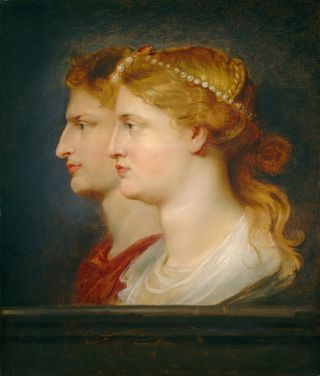 "Germanicus and Agrippina", partly because the traditional pairing seemed so odd (the Elder Agrippina hated Tiberius, whom she believed was heavily implicated in the death of Germanicus). But actually it's a pairing that makes perfect sense if you remember it could be what we would call "Tiberius and Vipsania". This is the sad loving couple who were forced to divorce by the imperial dynastic machine.
"Germanicus and Agrippina", partly because the traditional pairing seemed so odd (the Elder Agrippina hated Tiberius, whom she believed was heavily implicated in the death of Germanicus). But actually it's a pairing that makes perfect sense if you remember it could be what we would call "Tiberius and Vipsania". This is the sad loving couple who were forced to divorce by the imperial dynastic machine.
Now I have always felt a bit smug about my capacity to tell one Agrippina from another, but my visit to the Naples Museum suggested that was pride coming before a fall -- at least when it came to some famous Roman sculptures that go by the name of "Agrippina" -- although they almost certainly have nothing to do with any real life Agrippina at all.
There is a famous sculpture in Rome, known as the "Capitoline Agrippina", which was one of the sites of the eighteenth century tourist trail.. and (to a rather more modest degree) still is.
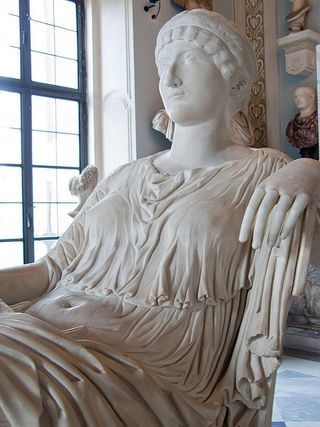
Eighteenth century tourists agreed it was an Agrippina, but argued ferociously about which Agrippina it was. Was it the virtuous (pain in the neck) Agrippina the Elder, or the incestuous and scheming Younger? And this was precisely the problem when Canova uses it as a model for his statue of Napoleon's mother? Which was she? And did it mean that we were supposed to see Napoleon as Nero (son of the Younger) or Caligula (son of the Elder -- despite her proclaimed virtue, she had a decidely dysfunctional son)?
The trouble is that the head (which is almost certainly fourth century AD, albeit presumably not original) couldn't fit with anything like a portrait of Agrippina. And modern views veer towards identifying her as Helena the mother of Constantine (though why exactly she should be nyone we've heard of beats me).
My shame, though, is that I have never thought how this "Seated Agrippina" related to the one in Naples (at the top of the post and to the right) from the Farnese collection. I had vaguely taken it on board, but hadnt thought  much about it. It is pretty clearly the same basic model, even though the hands are arranged differently And In truth it is rather high quality, and has a head (which has certainly been broken, but may, or may not be, the original refitted) that is a couple of centuries earlier than the Capitoline.
much about it. It is pretty clearly the same basic model, even though the hands are arranged differently And In truth it is rather high quality, and has a head (which has certainly been broken, but may, or may not be, the original refitted) that is a couple of centuries earlier than the Capitoline.
Anyway, I now have all sorts of questions.
First I wonder who or what the basic model IS. The label in the Naples Museum suggested that their version was the funerary monument of a freedwoman. Really?
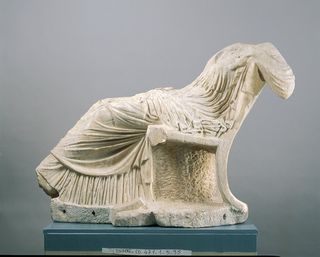 Second what is the relationship between this pair and the headless version now in the Musée Rodin? It's identified there as a copy of a seated Aphrodite, a version of a Phidian fifth century BC original. Really?
Second what is the relationship between this pair and the headless version now in the Musée Rodin? It's identified there as a copy of a seated Aphrodite, a version of a Phidian fifth century BC original. Really?
Third, do we get any early tourist comparisons between the Capitoline and the Farnese versions? Some travellers must have seen both of them. I dont recall any discussion of the pair, but then I wasnt looking for it.
Any ideas?
July 20, 2012
Degree day
As I have said before, I am a real beginner where degree ceremonies are concerned -- never (until yesterday) having actually "taken" a degree in my life. I have heard about what goes on inside the Cambridge University Senate House (all that finger stuff and Latin), but have never actually witnessed it.
So when I got the nice letter about getting an Hon DLitt from the University of Bristol, I was not only dead chuffed (among other things Bristol has a great Classics and Ancient History department, with a distinctively radical profile) -- I also realised that I'd have to do the full ritual thing (I don't think it's quite on to accept an hon degree and then say "can I have it by post please?")
I have to say that I did feel a bit of trepidation about all this. You can see the basic get up at the top of this post (and I have spared you the hat!) -- not my usual style.
So how did it go?

Truth is that I rather enjoyed it. That's not just because of the pleasures of vanity; though yes it was nice to hear an elegant eulogy read out by an old friend -- Bob Fowler, as orator (seen getting into his togs above!). And it's not just the pleasure of the generous entertainment, and meeting old and new friends (Chancellor of the University is the splendid judge Brenda Hale, and one of the Pro Chancellors is Carol Black, who is to be Newnham's next principal -- sat up till one in the morning with Carol, talking college things, and being politely ticked off by a nervous young hotel porter for making a little too much noise).
It's more the general celebratory atmosphere, which you couldn't help picking up. In my case I got my degree after the undergrads in Classics, Archaeology, History and History of Art had picked up theirs. This meant hordes of young people enjoying success with their Mums and Dads (though I couldn't help wondering if some mini human tragedies were being disguised... the kids who hadnt got the results they needed, or disappointed 2.2s putting on a brave face). Unike Cambridge where, I'm told, absolutely no clapping is allowed -- there was plenty of applause and shouts and whistles (more raucously as the afternoon went on).
But I also couldnt get out of my head the idea of how these big public ritual occasions do tend to bleed into one another. That's to say, it felt quite suspiciously like a wedding, even if not quite in the right order. I walked down the aisle to be given away by a smiley "bedell", listened to the sermon (that's the eulogy), and then put out my hands to make my vows . . .
It was no doubt this sense of similarity that made me instinctively given the Vice Chancellor a kiss after the vows....
Now kiss the bride I thought.
Maybe it will become a new tradition.
July 16, 2012
A closer look at the tyrant slayers
As the husband rightly says, art history is pretty easy if you do it from books. It's when you take a closer look at the objects themselves that things get more difficult.
Well so it appeared today in the Naples Archaeological Museum, taking a closer look at the so-called "Tyrant Slayers" (or, rather Roman version thereof).
The standard story of these is complex in its own way, but has a relatively simple ending. The subjects in question are the Athenian heroes, a pair of lovers called Harmodius and Aristogeiton; these became canonised heroes of the fledgling Athenian democracy in 514 BC, when they killed Hipparchos -- the brother of the ruling tyrant -- who had (among other his other crimes) made up to Harmodius.
It was in fact a bit of a bosh shot. The pair managed to kill Hipparchos, but not the ruling tyrant Hippias, and they both ended up dead. But it was the first step in the deposing of the autocratic regime; and when Hippias had actually been got rid of, the new democracy put up a statue to honour the "tyrant slayers", by the sculptor Antenor.
This didn't last long. When the Persians sacked Athens in 480 BC, they took this symbol off with them, and it ended up in Susa. Although Antenor's version was later returned to Athens, the substitute statue that the Athenians commissoned (by Kritios and Nesiotes) quickly became the iconic image.
Neither the original or substitute actually survive, but what we are always told is that the Roman version in Naples (from the Farnese collection) of Kritios and Nesiotes' "Tyrannicides" is a fairly good approximation (unless you think that the Naples version actually copies Antenor's statues, which a few people do). And that's what you see above (Aristogeiton on the left).
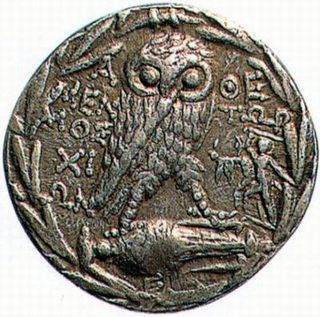 It all looks a pretty tight fit, especially if you take into account some classical Greek coins which show a pair of figures rather like that (on the left.. the little figures to the right of the owl), a few Greek pots showing the assassination in much this pose and a plaster cast of the face of the bearded Aristogeiton found at Baiae.
It all looks a pretty tight fit, especially if you take into account some classical Greek coins which show a pair of figures rather like that (on the left.. the little figures to the right of the owl), a few Greek pots showing the assassination in much this pose and a plaster cast of the face of the bearded Aristogeiton found at Baiae.
Looking at them yesterday, it all seemed a bit looser.
For a start, noone knows where these statues came from. There are unconfirmed and unreliable reports that they came from Hadrian's Villa at Tivoli (but there are unconfirmed and unreliable reports that all kinds of things came from there). All we really know is that the "Tyrannicides" were in the collection of Margaret of Austria (where they were drawn several times in the course of 16th century) and they went into the Farnese collection in 1586.
More interesting, and no less unpredictable, the pair have been hugely restored from the sixteenth century onwards, probably more than once. Not just the limbs. Aristogeiton (the older bearded one) was  actually found headless, and currently sports a cast of a "head of Aristogeiton" from the Vatican (and you may see, on the right, it doesn't quite fit, despite the fact that this is the "canonical image"). In the late nineteenth century this "Aristogeiton" wore a quite different, beardless head (I'm not sure what happened to that). Harmodius seems to have been found with his head, but otherwise was pretty much a limbless torso, now restored as we see him.
actually found headless, and currently sports a cast of a "head of Aristogeiton" from the Vatican (and you may see, on the right, it doesn't quite fit, despite the fact that this is the "canonical image"). In the late nineteenth century this "Aristogeiton" wore a quite different, beardless head (I'm not sure what happened to that). Harmodius seems to have been found with his head, but otherwise was pretty much a limbless torso, now restored as we see him.
And for a long time the pair of them were identified as gladiators anyway.
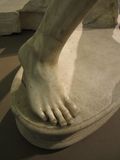 But even more curious were the bases, which certainly don't match. Aristogeiton's (left) looks like a bog-standard free standing Roman imperial base. Harmodius' base (below right) looks for all the world like a base that was inserted into something else, and it certainly isn't a pair for Aristogeiton's.The big Farnese catalogue says the Harmodius base is a restoration, and so it may well be (especially if the legs are restorations anyway).
But even more curious were the bases, which certainly don't match. Aristogeiton's (left) looks like a bog-standard free standing Roman imperial base. Harmodius' base (below right) looks for all the world like a base that was inserted into something else, and it certainly isn't a pair for Aristogeiton's.The big Farnese catalogue says the Harmodius base is a restoration, and so it may well be (especially if the legs are restorations anyway). 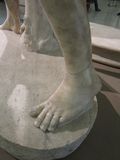 But it isn't all of a piece. The back half (under the back foot) is clearly different from the rest of it...So the restoration has gone in two phases.
But it isn't all of a piece. The back half (under the back foot) is clearly different from the rest of it...So the restoration has gone in two phases.
One thing is for sure: they have not always been seen as (or restored) as a pair.. though at some point Harmodius' tree-trunk support (which is definitely post-antique because it supports his already damaged bum, as you see below left) has been made to match Aristogeiton's "original" support.
All in all, it is hard to undermine the coin evidence for the "Tyrannicides" group, but the Naples "pair" (and it's the only surviving copy of the two of them) looked a hell of a lot more fragile after 30 minutes looking.
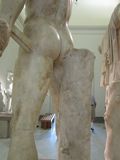 (I should confess that now I have done a bit of work on these -- such as you can from a Neapolitan hotel -- I suspect that some serious reading might have brought up these difficulties. But autopsy brought them up a hell of a lot quicker!)
(I should confess that now I have done a bit of work on these -- such as you can from a Neapolitan hotel -- I suspect that some serious reading might have brought up these difficulties. But autopsy brought them up a hell of a lot quicker!)
July 12, 2012
The f-word and the c-word
I haven't the foggiest clue about the John Terry case, but the BBC reporting of what he is supposed to have said on the field is side-splittingly awful. It was " an f-word, black, c-word".
Who the f-word does this protect? Or whose sensibilties is it meant to uphold?
Ok let's imagine that you are listening to some news bulletin with your 10 year old. S/he says what an f-word, mummy? Do you then lie and say "oh it means funny word" or do you tell the truth and say "fucK'?
And what is the down side of telling the truth? Either they know the score, or they don't...so where is the corruption? (It reminds me, as I thnk I've said before, of going to Greece with the kids 20 years ago, and finding that all the Greek toddlers were supping their Coke and crisps in front of films that no under-16 would get into in the UK..and no apparent harm was being done to the Greek children.)
There is a bigger problem though which this kind of censorship. Whatever Terry did or did not say, having it read out in a BBC voice, duly bastardised, only gives it authority. It reminds me of the Thatcher days,way back when -- when any statement of the IRA could not be read by the real Irish spokesperson, in his (usually his), real voice, but had to be read by some upstanding young Englishman.
The result was a complete own goal (and just shows you how limited Thatcher's vision and understanding was). The voices sounded a bit silly.. But they were brought down disdain on the UK government with all the authority that Received Pronunciation can offer. Gerry Adams's word came out all posh and old-Etonian.
So maybe we could just be allowed to hear what John Terry is really supposed to have said. Who is it supposed to corrupt?
It is also the case that words have changed very quickly, and change their sensibilities. When I was a kid, I think it would have been "Fuck, b-word, c-word"....but "black" and "fuck" have swapped paces in the last few decades, so now we cant say "fuck" but we can say "black".
Good or bad, who the f-word knows?
(Does anyone else remember when "black "was unsayable -- not, as I am happy to acknowledge now, a badge of right and proper pride?)
July 8, 2012
A glimpse of THAT TORCH
The Olympic Torch was due to pass our house this morning at about 7.00 am. After arriving in Cambridge yesterday, being run around Trinity College Great Court at 6.00 am ish (a strictly invitation only event -- just when we're trying to show the nation's young that Cambridge Uni is ACCESSIBLE....errr?), then loaded on a punt for a hundred yards or so, it was due to be relayed up Huntingdon Road, just where we live, before being put back in its bus to whizz along the A14 to St Ives.
You can't say that we weren't well prepared.
The local council had filled a good few web pages with nanny-state advice to local spectators:
"Check the local weather forecast on the day of the Relay," they advised, "and come prepared – big brollies or sun-cream and hats may be in order!" (Thank you council, we might have forgotten the  brollies I guess...that's us on the right!)
brollies I guess...that's us on the right!)
"Bring a bottle of water if you think you might be standing outside for long periods." (Another thing we might foolishly have forgotten.)
"Bring your camera and mobile phone to capture the moment" (... oh come on...).
And then the local paper carried a message from the Prime Minister, to commemorate the great occasion. "The Games give us a fantastic opportunity to sell the East
Presumably someone in the PM's office adjusts the template of the leader's message for each local paper on the torch's route. In this case s/he scored a bit of an own goal: the last thing Cambridge needs is more tourists in central Cambridge, and more potential victims of the local punting touts; it's already full to capacity... and we need to get the tourists a bit more widely spread.
Anyway, not to be put off by all this (it was a close call), we trooped outside at about 6.45, and crossed the road, so as to be on the left hand side, where the free gifts were to be distributed to the cheering throngs from the Olympic sponsors. I was rather hoping that Samsung might be chucking out a few free mobile phones.
So what was the verdict?
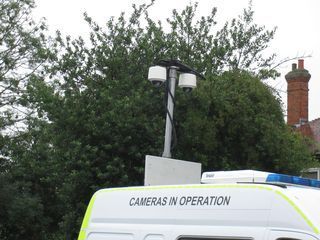
Well I have to admit, killjoy that I am, that quite a few people did turn up even though it was before breakfast on a Sunday morning, and peeing with rain. And it was a nice good humoured mixture of types. Glad I didn't miss it. But....
It was all a bit heavily policed. A police surveillance vehicle (above) was already installed in the lay-by  outside our house, filming the potentially dangerous crowd. And there were an awful lot of boys in yellow... Metropolitan police officers zooming up an down on their motorbikes (again to be fair, they were quite jolly types...minding the public in leafy Cambridge must be a change from crime fighting in the smoke).
outside our house, filming the potentially dangerous crowd. And there were an awful lot of boys in yellow... Metropolitan police officers zooming up an down on their motorbikes (again to be fair, they were quite jolly types...minding the public in leafy Cambridge must be a change from crime fighting in the smoke).
And it was all horribly commercially tacky... the torch-carrying bit was OK, but the  "convoy" was really an advertising opportunity for the sponsors. (Dream on about the free mobile, but the junior member of our party did get a small bottle of coke.. and we had a handful of flags, advertising Samsung.)
"convoy" was really an advertising opportunity for the sponsors. (Dream on about the free mobile, but the junior member of our party did get a small bottle of coke.. and we had a handful of flags, advertising Samsung.)
Actually, we probably missed the best bit. One of our neighbours biked down to the church at the crossroads, at the bottom of Castle Hill. And there she found  something a whole load better than the piped music blaring out of the Coca Cola bus: free coffee being dispensed in the churchyard, and a Sally
something a whole load better than the piped music blaring out of the Coca Cola bus: free coffee being dispensed in the churchyard, and a Sally  Army band, leading some communal hymn-singing.. "Guide me oh Thou Great Redeemer" to the tune of Cwm Rhonnda and "Dear Lord and Father of Mankind" (though I'm not sure how appropriate the bit about "earthquake, wind and fire" is..). And they received blessings from Luton, where the torch had last been, and sent them on to St Ives and Huntingdon.
Army band, leading some communal hymn-singing.. "Guide me oh Thou Great Redeemer" to the tune of Cwm Rhonnda and "Dear Lord and Father of Mankind" (though I'm not sure how appropriate the bit about "earthquake, wind and fire" is..). And they received blessings from Luton, where the torch had last been, and sent them on to St Ives and Huntingdon.
It probably broke all the rules about no-one else apart from the official should be allowed to profit from the Olympic torch relay. But -- God or no God -- give me a live band and hymns any day, rather than a bus advertising the kind of fizzy drinks that we're trying to discourage kids from consuming.
*************
Oh look... here's Wenlock (or is it Mandeville?) in his bus with all the spare torches 
Mary Beard's Blog
- Mary Beard's profile
- 4112 followers






